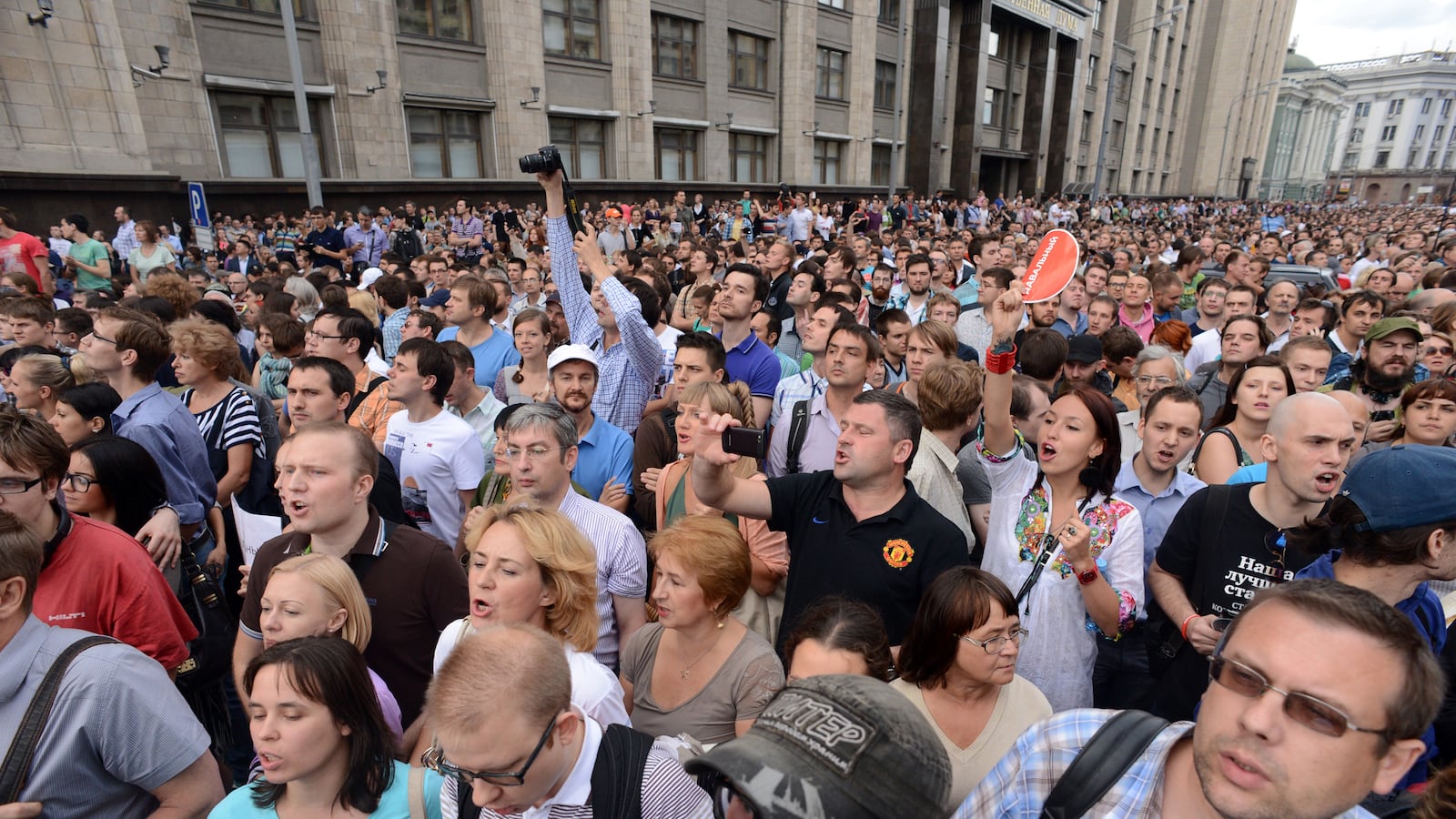The pale faces of officials appeared in the windows on the second and third floors of the Russian Parliament. They were watching with tension as thousands of people outside stood chanting and clapping their hands, crying: “Freedom! Freedom!” People kept arriving to protest against yesterday’s court decision to sentence their favorite leader, the 37-year-old lawyer and blogger Aleksei Navalny, to five years of prison for embezzlement. Some supporters in the crowd compared their arrested leader to Nelson Mandela and Vaclav Havel.

But it seemed that even those who feared beatings and arrests gained courage once they saw how impressively large the rally appeared. Rivers of protesters ran along both sides of Moscow’s main street, Tverskaya, towards the Kremlin, and Manezh and Theater squares. Cars honked in support. Protesters clapped in appreciation; many smiled. Muscovites were rising up for a nonsanctioned protest, risking getting clubbed or detained, and facing a high chance of ending up in jail for an uncertain period of time.
Possibly, it was the stamina Navalny demonstrated in court yesterday that inspired so many people to come out and demand his freedom. (He has since been released.) Rain TV, a television channel broadcasting the Web feed live, showed Navalny constantly tweeting from his phone, as if the verdict did not concern him. Hours passed by and the judge read his charges in a monotone. Navalny’s face had expressed more fury in 2010, when a Moscow court decided to send another Putin critic, Mikhail Khodorkovsky, back to jail, and last August, when the same court convicted three members of Pussy Riot punk band. “I came here because of Navalny’s last tweet. I am not lazy and just like him I want Russia to be a European country,” a young professional, Maksim Smolianinov, said.
Yekaterina Samutsevich, a member of Pussy Riot who spent six months in jail last year for playing her guitar at a punk performance at Moscow's Cathedral of Christ the Savior, told The Daily Beast: "This is so absurd and ignorant: authorities once again showed their muscle by putting their opponent to prison."
Navalny’s last tweet read, "The most important thing is not to be lazy; a toad won't lift itself off the oil pipe." Experts said that by locking Navalny in prison for so long, the Kremlin helped his popularity. “They write his significant biography as a hero,” said the former chief editor of Newsweek Russia, Leonid Parfenov, who came to demonstrate against Navalny’s arrest. Polls by independent Levada Center showed that 57 percent of Muscovites and 44 percent of Russians say that they think the Kremlin controlled Navalny’s case.

"Even those who did not support Navalny originally could see that his court case was revived and developed in order to punish him for constantly tempting and teasing the government," former minister of economy Yevgeny Yasin said in an interview with The Daily Beast.
Rallies and detentions occurred all across the country, from Moscow to Vladivostok. By 9.30 p.m. yesterday police had detained around 100 in Moscow and St. Petersburg. But arrests do not surprise anybody here; authorities have ordered arrests of political opponents throughout the entire 12-year era of Vladimir Putin. But for the first time, the opposition lost a major leader, a man who had a chance to play a serious role in Russian politics. Yesterday Navalny had received an official paper that said he was a registered candidate for Moscow mayoral elections—and today he was convicted.
A group of young friends in the crowd were smiling happily as they watched more rows of police and soldiers line up along both sides of Tverskaya Avenue. “This is the end of your time Putin!” one of them yelled. Somebody suggested that now authorities would not let the convict Navalny run for the next presidential elections. A middle-aged doctor, Yuri Momot, rejected the idea: “Of course Navalny would run and beat Putin, sooner than these crooks think,” Momot said, waving in the direction of pale faces behind the glass.





